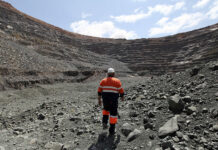
LUCARA Diamond Corp. said on Monday it would take a hands-on approach to the completion of the $684.3m Karowe underground project, the costs of which have spiralled out of control in the past.
The Canadian miner announced the termination of the project manager JDS Energy & Mining’s contract replacing it a ‘master service agreement’. This would improve its ability to control costs, take quicker decisions and have better project oversight.
In the place of the project contract JDS had previously, it would focus on specific components of the job, described by Lucara has a ‘master agreement’.
“We are confident that this strategic shift in project management will allow us to better leverage our team’s deep understanding of the Karowe mine and its unique characteristics,” said William Lamb, CEO of Lucara Diamond.
The Karowe open pit mine, situated in Botswana, has yielded some of the world’s largest diamonds in recent times. Lucara recovered the 2,488 carat (ct) ‘Motswedi stone unveiled in August, second in size only to the 3,106ct Cullinan diamond discovered more than a century ago, now set in the UK crown jewels.
The project, which is planned to replace mining from the Karowe open pit, ran into development problems in 2023 resulting in a project overshoot on budget and timeline. It is expected to be completed in the first half of 2028, two years late. Lucara said in February $347.9m of the project capex has been spent to date.
Lucara’s bind is maintaining ore feed to its plant as its open-pit mine depletes. While stockpiles suffice, there is grade depletion which raises questions about production from 2027 until the project begins.
Commenting today, Lucara said the production shaft had reached over 720 metres below surface and the ventilation shaft has now reached over 680 meters below surface. “Substantial advancements have been made on the production man and materials winder building, with the majority of the required surface infrastructure already in place,” it said.
“By taking direct control of site-based activities, we are positioning ourselves to respond more rapidly to project needs and challenges,” said Lamb, adding that it would result in “enhanced value to our shareholders and stakeholders”.











